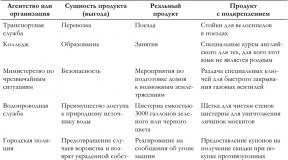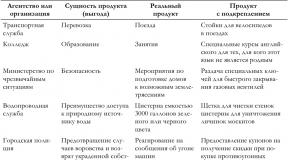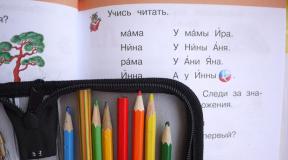Master spelling. Constant and persistent practice. Learning in a playful way
One of the most important indicators of school performance is the literacy of writing dictations. But it happens that it is difficult for a child to cope with this seemingly uncomplicated task. Are there ways to help you learn how to write dictations? How to improve literacy, teach to write without mistakes and not discourage at the same time the desire to learn? Let's consider these and other questions further.
What is the essence of dictation
From grade 2, students write dictations regularly
Dictation is a type of written work that involves checking the spelling and punctuation knowledge of the literary form of the language. Dictations by native language - this is an integral part of schooling from grades 2 to 11. However, the requirements when writing this kind of writing test work united:
- the child must reproduce the text read by the teacher in a notebook (according to sentences);
- the student hears each sentence three times (for familiarization and understanding of certain rules, for writing and for checking);
- when writing, the student applies the learned spelling rules, checks the punctuation marks in accordance with the intonation of the teacher;
- after the end of the dictation, schoolchildren independently re-read what they have written, make corrections if necessary.
Thus, dictation is a form of work that tests the literacy of schoolchildren.
At what age should you pay attention to literacy
To improve the child's literacy level, they should be dealt with individually.
It is interesting. According to a nationwide study of the level of literacy in the country, 70% of schoolchildren make more than 4 mistakes when writing dictations.
How happy parents are when the baby starts babbling the first words, and then his speech becomes more and more understandable, meaningful. Then moms and dads begin to teach the baby to write. And to do it without mistakes. However, this is a serious miscalculation of the parents - the time must come for learning to write competently.Scientists have found that the formation of the literacy level is almost completely completed by grade 4. That is, you need to work with the child to increase the spelling level most intensively from grade 2 to grade 4. Further, there is a build-up of knowledge about the language, which lies on the already established informational ground formed in the initial link.
Please note that if it is impossible to teach a child to write spelling, dysgraphia should be excluded - a violation of the principle of writing with the normal development of intelligence. This disease is usually accompanied by speech disorders and some mental disorders.
How to teach a child to write correctly and without mistakes
Reading - the best way improve literacy
So that your child does not have to blush for poor grades in dictation, you will have to make an effort and find an approach to teaching a student. There are several common techniques.
- Write dictations regularly. This is a rather boring exercise, but 2 dictations per week will give their results in a couple of months. Only it is imperative that you do the analysis of mistakes together with your student, focusing on the correct spelling of those words that previously caused difficulties - this way the baby will remember their spelling even better. By the way, in this technique, hints are only encouraged. Also, complex words should be repeated and written down 2-3 times.
- As for the exercises, they should be selected according to the language rule that causes difficulty in the child. For example, if these are unstressed vowels in the root, then exercises can be for substitution or filling in missing letters, selection of test words. It is very important to point out the error correctly. Do not highlight it with red paste. It is much more efficient to spell out the misspelled word surrounded by correctly spelled words. And the child is offered to rewrite the entire list several times and identify the error. So the student will not only think carefully about the spelling rules, but also remember the graphic image of words.
- Read aloud systematically.Reading is great for developing literacy. After all, it involves all kinds of memory. This truth has been proven by more than one generation of students. It is advisable, of course, to select texts that are interesting for the child. But it is worth considering the fact that the purest literary language is presented in the works of Tolstoy, Turgenev, Chekhov and Bunin. Only you need to read them correctly: breaking words into syllables. It will also be effective to teach the baby "role" reading: the baby must read the text as we write, and then as we speak (older children can be offered to explain the rules of writing certain words).
- Turn learning into a game. Children love to play - this is an indisputable fact. And best of all, they remember the knowledge that they acquired during the game. Prepare cards with the words in which the child makes mistakes, and hang them over writing desk... Visually bumping into them, the kid will remember the spelling. Periodically play "cards" with him: you should prepare a pile compound words, from which the child draws a card and explains the spelling. You can periodically do the "Hour in reverse": invite your student to be a teacher for a few minutes, explaining the rule or dictation on this language norm.
- Offer cross-checking.Dictate short texts to each other. Deliberately make a few mistakes, exchange dictations and check what you have written. If the child cannot find your mistakes, give a hint: specify the number of misspelled words or missing punctuation marks. With the help of such a game, the student develops attention and memory in relation to words, phrases and punctuation rules.
- Motivate. Few of the schoolchildren have a clear idea of \u200b\u200bwhy they need writing skills. The task of teachers and parents is to convey to the consciousness of the younger generation that their literacy is the basis of the life of a literary language, as well as a very remarkable sign of a person's growing up. For clarity, you can take the kid to your work (or to friends) so that he understands the importance of correct and competent drafting of legal papers and contracts.
Video: Sample dictation to prepare your toddler for classroom work
The ability to write correctly is an important part of a person's life. After all, you must agree that it is much more pleasant to communicate with someone who always correctly expresses his thoughts. It seems there are a lot of books on grammar, the Internet, and even at school they give the elementary foundations of the Russian language. There is a lot of information, but for some reason many people are simply not able to master all the rules. What is the reason for this? Perhaps because Russian is one of the most difficult languages \u200b\u200bin the world.
Although those who are still unable to understand grammar should not despair, because there is an alternative to simple memorization of the rules, and it is much easier than we can imagine, otherwise we would not all have mastered the elementary rules of competent writing. So, what is this method that will allow you to learn how to write correctly without memorizing the rules. In fact, there is not one way, but several, how to learn to write correctly... This article will look at two of them.
Method number 1. Reading books.
Everyone knows that in any business practice allows you to achieve much greater results than theory. So when you start reading directly, you practice. The essence of this method is that by constantly reading books and meeting the same words, you memorize their writing, but provided, of course, if you have a good visual memory, otherwise you will still have to learn the rules, although there is one option: listen to or watch video lessons on grammar of the Russian language, if your visual memory lets you down, then you probably have an auditory memory.
Method number 2. Tests.
It is based on this training format: take a collection of tests in the Russian or Ukrainian language (if you are from Ukraine), since it is now easier to acquire them, all thanks to the Unified State Exam or in Ukraine - VNO. And solve tests to prepare for UPE, relying on the rules in incomprehensible questions. What is the essence of this method? This is how you combine theory with practice. And the result of mastering the material is much better, because you support theoretical questions with different examples in tests.
And finally, this advice: in connection with the emergence social networks illiterate spelling has come into fashion, one might say. Young people write messages clumsily, completely oblivious to literacy, and as a result, this habit takes root, so write correctly anytime, anywhere.
How to write without mistakes? Quite a reasonable question for a person of any age. You can have the most sophisticated manners, dress "with a needle" and look like a movie star.
However, there is one nuance that will prevent you from being successful - illiteracy. Errors of all kinds must be fought. How?
Books will teach you how to write without mistakes
Read more. This is the first and perhaps the most important piece of advice. Not a day without a book! This should be the motto of a person determined to do away with mistakes. Regular reading develops visual memory, which will become a reliable assistant in the fight against.
Read not only to yourself, but also out loud, "with feeling, with sense, with consistency." Take your time, think about what you read. Make it a rule to write down the most difficult and incomprehensible words. It would be nice to clarify their meaning at the same time. Over time, such an attentive attitude to the word will become good habitto help you become literate.
Use spelling dictionaries... Moreover, preferably not electronic, but printed: leafing through the pages in search of the right word, inevitably you pay attention to the neighboring words. It is possible that at a certain moment the visual memory will also prompt their writing.
Rules are the path to error-free writing
Learn regulationsand try to put them into practice. The recommendation seems to be banal, and at the same time very useful. Only a few can write competently, without knowing a single rule. To do this, you must have an ideally developed visual memory, that is, be, in fact, a phenomenal personality. Agree, there are few of them among us.
However, knowledge of spelling rules by itself is not a guarantee of practical literacy. Spelling skills need to be consolidated, so exercise systematically . For this purpose, I advise you to use the time-tested manual of D.E. Rosenthal “Russian language. Exercises and Comments ”. By the way, Rosenthal is considered one of those few linguists who managed to "straddle" the Russian spelling. A fact that deserves attention, isn't it? Rosenthal knew exactly how to write without mistakes.
- I know the rules, but I write with mistakes, -
we hear similar complaints from both children and adults. How to write without errors in this case? One of the reasons for this situation is insufficiently formed spelling skills. School teachers in Russian language lessons are quite active in this direction. If the activities of the teachers do not give the desired result or, due to your considerable age, you no longer attend school, you cannot do without self-study.
There are a number of seemingly simple techniques that help to significantly increase the level of practical literacy. . Try rewriting ready-made printed texts. For example, open a book and rewrite the first paragraph of any work. Then check it carefully. Did you make mistakes? Rewrite again. The result will become noticeable after a month of regular exercise.
When you learn to rewrite the text correctly, move on to the next stage - writing from memory. Take at least the same Turgenev, read the first sentence - then close the book and write it down as you remember it. Check the text. If mistakes are made, write again. Over time, complicate the task, try to write from memory, first two sentences, then a whole paragraph, etc.
Literacy in writing any texts or business papers is an indicator of a person's education, inspiring disposition towards him. IN modern worldwhere people have to type more than write, literacy is rarely thought of. It is enough to use one of the spelling programs, as the computer will underline the incorrectly typed word and all that remains is to correct the error.
It is here that an unpleasant surprise lies in wait for many. When getting a job and filling out long questionnaires by hand, which employers often use now, a person unexpectedly realizes that he is not sure of the correct spelling of this or that word. And if the employer may consider one mistake an annoying slip of the tongue, then the presence of 2-5 grammatical errors and "lame" stylistics can become a decisive reason for your profile to be placed in the folder of not hired applicants.
And the level of literacy is important not only for finding a responsible job. A note with gross errors, left to a competent colleague or neighbor, will warp him. Knowing you well, he will not say anything, but he will draw conclusions for himself about your ignorance. And this is especially annoying if you have a diploma (or two) in higher education.
It is only in the proverb "they meet by their clothes." In modern business life, much more is often expected from a person, including impeccable literacy.
Learning to write correctly.
If you notice that your literacy is not up to the mark, you should not dismiss the problem, especially since it is solvable.
To learn how to write without mistakes, you need to outline a sequence of actions. And you need to start with the simplest - with spelling. The easiest way to improve literacy is reading. Only you need to approach him responsibly. First, you only need to read good literature. One that will help you "kill two birds with one stone" - to see how words are spelled correctly and to feel the beauty and variety of metaphors that good literature abounds in. Therefore, the works of the classics are best suited. You can limit yourself to those of them whose works in prose or poetry are read and understood easily. For example, Prishvin, Kuprin, Tyutchev, Pushkin.
Remember that reading on the road - on the subway, train, in the car - especially if you prefer tabloids or pulp fiction, will not do you any good. This "literature" quite often suffers from grammatical and stylistic mistakes and only in exceptional cases can it be an example of competent and beautiful speech.
Read the correct literature for at least 30-40 minutes a day, and preferably 1-2 hours daily. But this is not enough. What your memory received in the process of reading must be fixed. And for this you need to write as much as possible. Therefore, train constantly. Leave notes and letters to friends and family more often. Share your problem with them and ask them to carefully read your messages and point out any mistakes.
With a serious approach to business, literacy increases already after 2-3 months of regular reading and writing exercises. But this is a skill that needs to be constantly reinforced until it becomes automatic. To make the process easier and faster, keep a spelling dictionary at hand.
But this is not the only way to master literate writing. The second way is to learn the rules of spelling and punctuation. If you decide to go this way, it is better to involve a teacher or someone who is fluent in this knowledge. Even an excellent high school student can help you.
How to teach a child to write without mistakes.
Practice shows that those adults who read a lot, wrote a lot and took subjects such as Russian language and literature seriously at school do not have problems with grammar and stylistics. Therefore, the easiest way to instill literate writing skills from school age.
Unfortunately, today's children do not always succeed in literacy. This suggests that the most favorable moment for learning was missed and now it is necessary to correct the situation.
You will have to start with the same thing as adults - read and write more. Before you buy a book for a child, check it for errors. Buy only high-quality books with beautiful pictures that can interest your child and encourage him to start reading the book.
Train your child in spelling more often. Let him rewrite the texts, gradually complicating the tasks. Arrange dictations. Often include words that your child has difficulty spelling. Invite your child to write the most "problematic" words several times in a row on a separate sheet. Periodically arrange dictation only from separate words, where there will be one word for two or three familiar words, which cause serious difficulties with writing.
Find literacy tests on the Internet, where a child can not only find out his level, but gradually improve it, each time increasing his rating.
Tell your child more often that a person who can speak beautifully and write competently has much more chances to receive a prestigious education and good workthan his illiterate peer.
Schooling almost always involves a lot of effort. Moreover, both on the part of the child and his responsible parents. And one of the fundamental points for a student for all his school years (and not only) is the ability to write correctly.
However, as important as this skill is, it is just as difficult to develop. Errors in the notebooks of a student of any class do not surprise anyone. However, if they are repeated over and over again, this becomes a cause for concern for parents and teachers.
In this case, it is important to find out why literacy suffers: is it only the child's lack of attentiveness and perseverance that is to blame, or does the reason have a medical explanation?
What is dysgraphia?
Today, children are increasingly diagnosed with dysgraphia. This is a disorder in which the child is unable to learn writing skills. At the same time, he may know the rules of the Russian language by heart, but when it comes to practice, the student cannot write without mistakes.
Dysgraphia is expressed by the following "symptoms" for which one should be alert:
- the child writes unnecessary elements of letters or, conversely, does not add letters;
- some letters and numbers are written in mirror image;
- letters are often missing in words;
- in writing, the child rearranges the syllables in places;
- letters are repeated in the word ("lalina" instead of "raspberry", etc.);
- there may be no spaces between words, periods between sentences;
- lines often continue beyond the margins of the notebook.
If such phenomena are systematic, it will not be possible to master an error-free letter in a short time. However, the situation is fixable. If the mistakes are of a different nature, the fault is the baby's inattention, which will also be dealt with over time.
How to help a student to write correctly with dysgraphia?
If you suspect that a child has such a disorder, you should first of all contact a good speech therapist.
 When confirming the diagnosis, the parents have to work hard:
When confirming the diagnosis, the parents have to work hard:
"Magic dictation"
You can teach your child not to miss letters using the Magic Dictation game. Before you write a phrase of 3-4 words, you need to determine (tap) how many syllables there are in each of them, and fix each with a dash. In the next step, not syllables are indicated, but letters - by dots.
Mastering vocabulary words
If the child is not given vocabulary words, you can try to make a story out of them with him: the parent dictates the sequence of words to the child, and he comes up with a plot with them, pronouncing the correct spelling by syllables.
The sequence is then dictated again and a self-test is performed. You can also resort to drawing, highlighting the spelling (for example, the sun with the letter "l" inside).
"Foreign reading"
The method "Foreign reading" is no less effective, in which the child must read 5-15 minutes a day (depending on age) spelling, that is, as it is written ("Give the cow's milk"). This is how the visual images of the words are fixed. For such reading, it is best to use a spelling dictionary.
"Pencil" dictations and cheating
Arrange for the kid with dysgraphia "pencil" dictations and cheating: let the child write with a pencil, then he checks each word and erases the wrong letters with an eraser, entering the necessary ones. As a result, you will get a clean and competent text, which will be an excellent motivation for the student.
 In addition to these exercises, there are many others. They are aimed not only at developing the skill of correct writing, but also at stimulating the brain in general, which has a beneficial effect on the student's academic performance.
In addition to these exercises, there are many others. They are aimed not only at developing the skill of correct writing, but also at stimulating the brain in general, which has a beneficial effect on the student's academic performance.
Among them:
- games with constructor and puzzles,
- sewing on buttons,
- weaving from beads and beads,
- drawing miniatures,
- burning out - in general, everything that develops fine motor skills and makes both hemispheres of the brain work.
How can I help my child cope with inattention?
As we have already found out, not all schoolchildren make mistakes in their notebooks due to dysgraphia, most of them receive bad grades in writing due to banal inattention. It is not worth scolding children for this, but it is necessary to correct the situation.
In this case, games and exercises to develop the child's attention come to the rescue.
Here is some of them:
"Corrector"
Offer your baby to be a proofreader. At first, give the child the task to find a certain letter in the text and mark it. For older students, you can prepare a text with errors and ask to correct them, along the way pronouncing the rules of the Russian language, according to which this or that letter should be written.
 So in the child's memory both the rule itself and the correct spelling of the word will be fixed. Good effect gives such correction of texts written earlier by the student himself.
So in the child's memory both the rule itself and the correct spelling of the word will be fixed. Good effect gives such correction of texts written earlier by the student himself.
Games for changing the composition of objects and logic
Games like “What has changed?”: The child looks at a sequence of objects (drawings, toys, etc.) for some time, then turns away, and the parent removes one object or rearranges objects in places. The kid-player will have to determine what has changed.
All kinds of board games for logic: walkers, chess, checkers and backgammon, even "sea battle" - all of them will give a positive result. Puzzles and constructors are also good.
In addition, attention and writing skills can be developed in a child in other ways. The most important of these is reading. Read together, syllabically and fluently, regularly, with interest. On walks, notice signs and announcements, price tags, determine if there are errors on them.
In addition to reading and exercise, it is certainly important for the student to organize the correct diet and daily routine, play in the fresh air, dance or exercise. All this will keep the brain in good shape, while not unnecessarily straining it, which means that it will be faster to teach a child to write without mistakes.


















